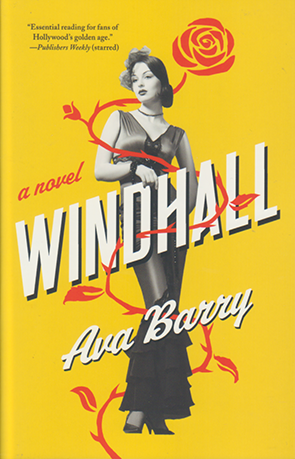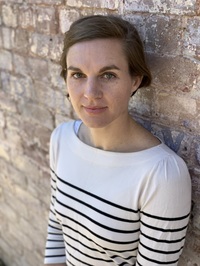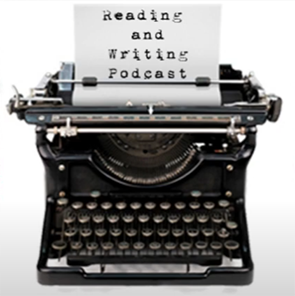Windhall is a murder mystery from the 1940s Golden Age of Hollywood. This review contains no spoilers whatsoever. While I make reference to some aspects of the story, this review does not give any hint how the story resolves, or even its plotting.
Central to the story of Windhall is Eleanor Hayes. Eleanor is the leading starlet of 1940s Hollywood. Then her body is found in the garden of Windhall, a classic Hollywood house now marked for historic status, where its owner and Eleanor’s director, Theodore Langley, is hosting a party attended by Hollywood notables. Eleanor, it appears, has been stabbed and her heart has been impaled. The chief suspect, Langley himself, is charged with the murder, but his trial is later abandoned when investigators are caught illegally trying to steal his journals from Windhall. Langley disappears and the murder of Eleanor Hayes is never solved. Yet the murder achieves a mythic status in Hollywood that endures until the present day. Eleanor was beautiful, rich and famous with another film underway. The mystery surrounding her death has all the intrigue surrounding the death of Natalie Wood, and the green silk dress with a red sash she was wearing when she died becomes emblematic, like James Dean’s Spider Porsche.
All this may have faded to the status of a Hollywood legend except that now (the year is approximately 2015) there is another murder near Windhall and the date and circumstances of the murder make it clear to Max Hailey and others that it is some kind of bizarre homage to the death of Eleanor Hayes. Hailey, who has grown up obsessed with the story fed to him by his actress grandmother, plans to write an article for the internet publication he works for, The Lens, which has been struggling financially and desperately needs to turn its fortunes around.
Ava Barry’s first novel is an assured and convincing portrait of contemporary Hollywood and the Hollywood of the 1940s. I was fortunate enough to visit Hollywood ten years ago, and I found this novel to be an evocative reminder of a suburb whose glamorous image across the world seemed, to me, to be belied by seediness and a pervasive air of desperation. Even in the 1940s Eleanor represents the dream of so many aspiring young women: to find fame and fortune. But that dream is beholden to a studio system that is seemingly all-powerful and rapacious. Despite her talent and charms, Eleanor is merely a cog in the Hollywood machine, readily replaced with any one of a thousand aspiring girls “who look just like her”.
The novel skilfully integrates its tales of old and New Hollywood into a cohesive narrative. The vestiges of old Hollywood are almost gone but they remain, still. Max’s house, bought by his grandmother from a failed silent era diva for cash in the 1940s, is emblematic of that disappearing world. The roof of his house and kitchen ceiling have holes in them and the structure is in danger of eventually collapsing. Max’s friend, Madeleine, whose house was once lived in by Raymond Chandler, is also custodian to the failing remnants of old Hollywood. She has to position rugs strategically to cover her damaged floorboards, there are holes in her walls, while a stuck door means she has to climb through a window to get to her back garden. Old Hollywood still exists, like Theo, now in his 90s, but it is crumbling, being torn down, forgotten and replaced, leaving only the stories.
I think the book not only characterises modern Hollywood well – its traffic, its rapidly changing face and constant reinvention – but it captures a sense of the Hollywood now lost, upon which its glamorous reputation rests. There are entertaining scenes, conveyed through Theo’s diary, in which Errol Flynn leads a group of Hollywood’s lesser stars and functionaries on house invasions as a fun contest to bring back the best prize. The Hollywood of old is a place of outlandish parties and questionable behaviour. And the sense of entitlement is further evident in the secret lives lived by the Hollywood elite. Max is told of “a secret road under Greenacres” but is assured that “of course, it’s probably a rumour.” Nevertheless, “Old Hollywood was very much a private world – if the old stars didn’t want to interact with the commoners, they didn’t have to.” Yet the studio system, itself, is one step up from the aristocratic elite of old Hollywood. Theo recounts in his journal that he has been warned, “People who piss off the studios have a way of disappearing.” The studios remain shadowy enterprises in the deepest recesses of this novel.
So, old Hollywood is paradoxical. It creates stars who seem untouchable like Flynn and his coterie, but who are vulnerable to the whims of the studio system with access to a vast pool of aspiring talent, making them expendable. Theo’s plan to make a film, Last Train to Avalon, is meant to be an exposé of the Hollywood system, which not only uses and controls its 1940s stars, but has its own share of predatory figures, much like our contemporary Harvey Weinstein. For those familiar with Hollywood history, the novel’s evocation of this period is strong and may bring to mind any number of stories. Theo’s decision to make his film, for instance, is reminiscent of Orson Welles’s Citizen Kane, which was a thinly disguised takedown of William Randolph Hearst, the great newspaper magnate. The film received boos for every nomination it received at the 1942 Academy Awards. Theo’s film, however, is repressed by the studio. The question is, did Theo kill Eleanor, as is commonly supposed, or was there a darker purpose to her murder in the service of institutional interests?
I was impressed by the narrative voice from the opening prologue of this book. Barry’s portrayal of Eleanor’s death evokes that sense of the loss of a legend, much like Marilyn Monroe whom Barry has written about. But equally skilful is her integration of the two periods which is signalled in a skilful transition in her Prologue, which compresses the decades between Eleanor’s death and the present, as well as at the same time suggesting the changing nature of stardom: “Home televisions replaced the fanaticism of classic movie theaters. Fans became caged by domesticity and the internet.” The world changes, comes closer, is more functional and manipulated. While stars may once have had their secret world, in the modern era they “shrank to fit the size of a mobile phone, easily tucked away for cigarette breaks at work.” This is why I think Windhall is a notable addition to the crime fiction genre. It’s highly readable, its plot is both complex and satisfying, and Barry has studied the tropes of crime fiction and applies them without making them feel worn. But there is also an evocation of something that is lost, if not entirely in the reality, then in the perception of what Hollywood once thought of itself. The murder of Eleanor has remained legendary because it remains a mystery, and so too has Theo, whose whereabouts have remained unknown before his reappearance. The novel is both a crime novel as well as nostalgic reminder of a world lost to our modernity, where the internet creates a desperate need for transient content and where stars are too accessible, their glow just a little dimmer. Windhall is well written, entertaining and well worth a read from a writer who deserves more recognition.

 RSS Feed
RSS Feed Facebook
Facebook Instagram
Instagram YouTube
YouTube Subscribe to our Newsletter
Subscribe to our Newsletter





